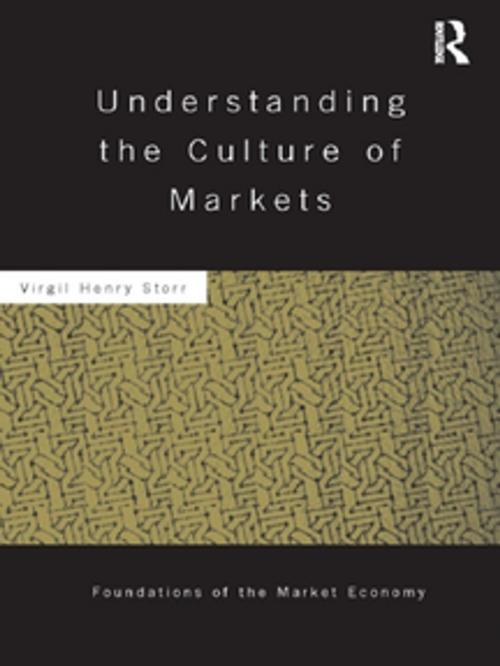| Author: | Virgil Storr | ISBN: | 9781136214103 |
| Publisher: | Taylor and Francis | Publication: | May 20, 2013 |
| Imprint: | Routledge | Language: | English |
| Author: | Virgil Storr |
| ISBN: | 9781136214103 |
| Publisher: | Taylor and Francis |
| Publication: | May 20, 2013 |
| Imprint: | Routledge |
| Language: | English |
How does culture impact economic life? Is culture like a ball and chain that actors must lug around as they pursue their material interests? Or, is culture like a tool-kit from which entrepreneurs can draw resources to aid them in their efforts? Or, is being immersed in a culture like wearing a pair of blinders? Or, is culture like wearing a pair of glasses with tinted lenses? Understanding the Culture of Markets explores how culture shapes economic activity and describes how social scientists (especially economists) should incorporate considerations of culture into their analysis.
Although most social scientists recognize that culture shapes economic behavior and outcomes, the majority of economists are not very interested in culture. Understanding the Culture of Markets begins with a discussion of the reasons why economists are reluctant to incorporate culture into economic analysis. It then goes on to describe how culture shapes economic life, and critiques those few efforts by economists to discuss the relationship between culture and markets. Finally, building on the work of Max Weber, it outlines and defends an approach to understanding the culture of markets.
In order to understand real world markets, economists must pay attention to how culture shapes economic activity. If culture does indeed color economic life, economists cannot really avoid culture. Instead, the choice that they face is not whether or not to incorporate culture into their analysis but whether to employ culture implicitly or explicitly. Ignoring culture may be possible but avoiding culture is impossible. Understanding the Culture of Markets will appeal to economists interested in how culture impacts economic life, in addition to economic anthropologists and economic sociologists. It should be useful in graduate and undergraduate courses in all of those fields.
How does culture impact economic life? Is culture like a ball and chain that actors must lug around as they pursue their material interests? Or, is culture like a tool-kit from which entrepreneurs can draw resources to aid them in their efforts? Or, is being immersed in a culture like wearing a pair of blinders? Or, is culture like wearing a pair of glasses with tinted lenses? Understanding the Culture of Markets explores how culture shapes economic activity and describes how social scientists (especially economists) should incorporate considerations of culture into their analysis.
Although most social scientists recognize that culture shapes economic behavior and outcomes, the majority of economists are not very interested in culture. Understanding the Culture of Markets begins with a discussion of the reasons why economists are reluctant to incorporate culture into economic analysis. It then goes on to describe how culture shapes economic life, and critiques those few efforts by economists to discuss the relationship between culture and markets. Finally, building on the work of Max Weber, it outlines and defends an approach to understanding the culture of markets.
In order to understand real world markets, economists must pay attention to how culture shapes economic activity. If culture does indeed color economic life, economists cannot really avoid culture. Instead, the choice that they face is not whether or not to incorporate culture into their analysis but whether to employ culture implicitly or explicitly. Ignoring culture may be possible but avoiding culture is impossible. Understanding the Culture of Markets will appeal to economists interested in how culture impacts economic life, in addition to economic anthropologists and economic sociologists. It should be useful in graduate and undergraduate courses in all of those fields.















